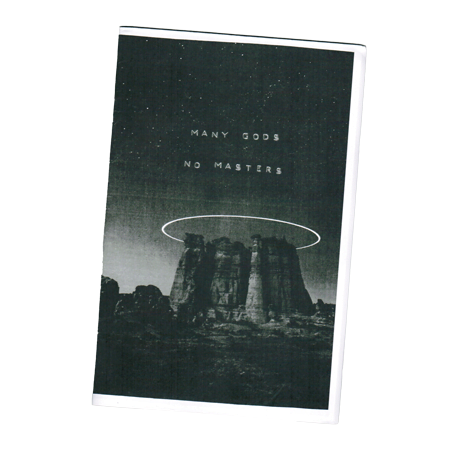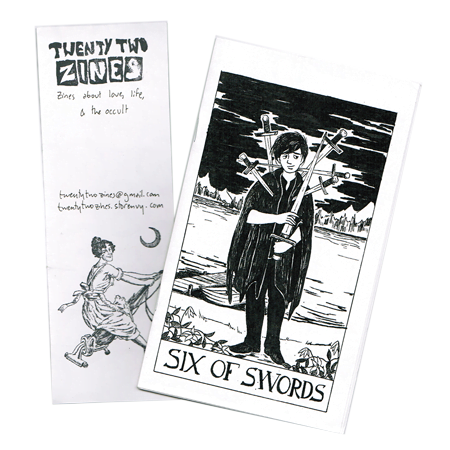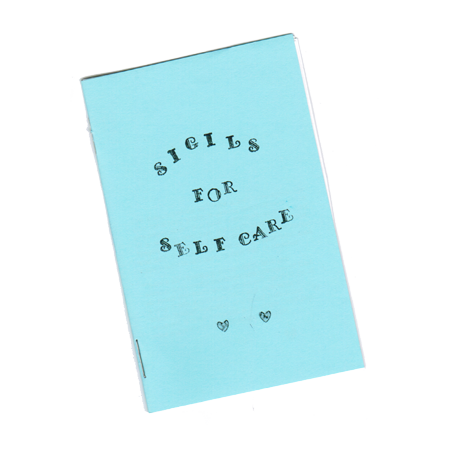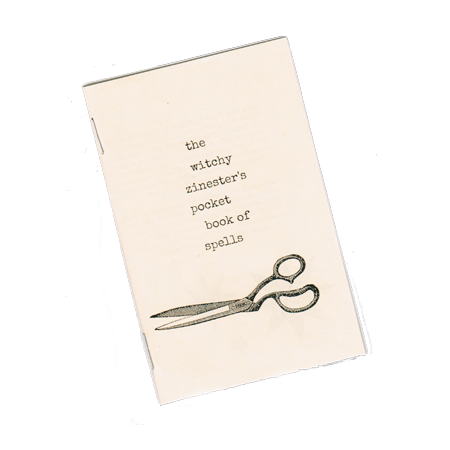Some Witchy Zine Reviews
Posted on December 2, 2022I’ve always found magic intriguing. As a kiddo, I dabbled in spellwork, making up charms and curses on the playground, filling shelves with special objects and jars with homemade potions, unaware that I was making simple altars and spelljars. At thirteen, I started to read the tarot, a practice I continue to this day. Yet for most of my life, I didn’t consider myself a witch. As an atheist, I thought the practice was closed to me… but that all changed in 2014, when I learned that secular witchcraft was a “thing” from Alex Wrekk’s great blog Up The Witchy Punx. Finding that blog felt like a lightbulb moment, like finally having words for an intrinsic truth about myself that I’ve known deep down all along. I’ve labelled myself a witch ever since.
And so, as a witchy zinester, my ears always perk up when I learn about magic, tarot, or spellwork zines. I’ve read a couple lately that I’d love to share with you:
|
|
Many Gods, No MastersI’m gonna be honest: I’m having trouble writing my review of “Many Gods, No Masters” by Elliott Stewart. And while it may not seem like it, that’s a compliment. I’m struggling to write this review because I don’t want it to be all heart-eye emojis and rambling praise… this zine is fantastic and I’ve become a bit of a fangirl for it! I feel absolutely connected to it. “Many Gods, No Masters” is a perzine about the author’s witchcraft practices, shot through with their anarchist beliefs. And so, as an anarcho-witch who loves perzines, yea, I’m smitten. This zine checks all the boxes for me. “Many Gods, No Masters” is at times deep, delightful, profound, silly, and oh so relatable. Part one covers Elliott’s pagan beliefs, their experiences as a follower of the deities Lugh, Brigid, Manannan Mac Lir, and An Dagda, their optimistic views on nihilism, and the holidays they celebrate. And while my own practices are decidedly agnostic, so much of Elliott’s systems, practices, and rituals resonated with me deeply. Their easygoing voice made reading this zine feel like a chat with an old friend, welcoming me into their stories and circle. Part two explores grief, remembrance, and mourning in a way that is heartfelt without being cloying, touching on their views on the afterlife and reincarnation. In the introduction, Elliott says that one of their goals “in writing this (zine) is to connect with other folks with similar beliefs” because “knowing folks are out there and I’m not by myself makes it a lot better to tolerate the bullshit days”. And that’s the goal of a good perzine, isn’t it? To feel less alone, to feel seen and held in community. I’m so glad that Elliott shared their zine with me, and I hope any other witchy zinesters out there who read this review pick up “Many Gods, No Masters” and enjoy the connection. Details: b&w, half-size, 48 pagesCost: $5 via etsy Links: etsy • website • instagram |
Many Gods, No Masters
I’m gonna be honest: I’m having trouble writing my review of “Many Gods, No Masters” by Elliott Stewart.
And while it may not seem like it, that’s a compliment. I’m struggling to write this review because I don’t want it to be all heart-eye emojis and rambling praise… this zine is fantastic and I’ve become a bit of a fangirl for it! I feel absolutely connected to it. “Many Gods, No Masters” is a perzine about the author’s witchcraft practices, shot through with their anarchist beliefs. And so, as an anarcho-witch who loves perzines, yea, I’m smitten. This zine checks all the boxes for me.
“Many Gods, No Masters” is at times deep, delightful, profound, silly, and oh so relatable. Part one covers Elliott’s pagan beliefs, their experiences as a follower of the deities Lugh, Brigid, Manannan Mac Lir, and An Dagda, their optimistic views on nihilism, and the holidays they celebrate. And while my own practices are decidedly agnostic, so much of Elliott’s systems, practices, and rituals resonated with me deeply. Their easygoing voice made reading this zine feel like a chat with an old friend, welcoming me into their stories and circle. Part two explores grief, remembrance, and mourning in a way that is heartfelt without being cloying, touching on their views on the afterlife and reincarnation.
In the introduction, Elliott says that one of their goals “in writing this (zine) is to connect with other folks with similar beliefs” because “knowing folks are out there and I’m not by myself makes it a lot better to tolerate the bullshit days”. And that’s the goal of a good perzine, isn’t it? To feel less alone, to feel seen and held in community. I’m so glad that Elliott shared their zine with me, and I hope any other witchy zinesters out there who read this review pick up “Many Gods, No Masters” and enjoy the connection.
Details: b&w, half-size, 48 pagesCost: $5 via etsy
Links: etsy • website • instagram
|
|
Six of SwordsI’ve been reading the tarot since I was 13 years old, and over the 20 years that I’ve grown acquainted with the cards, the one undeniable truth about them that I know for sure is that the tarot is a mirror. While rooted in a shared symbolism, each tarot pull is intensely personal, a way of looking into the abyss of your mind and hearing the scream, whimper, yelp, or whisper that echos back out at you. This understanding of the deeply personal nature of the cards is a big reason why the Twenty Two Zines tarot series by Wesley Sueker has become a favorite. In each issue, Wesley chooses a tarot card to examine,explaining both the traditional symbolism, as well as his own associations with it. He illustrates each issue’s cover with his own take on the card and shares personal stories that helped him deepen his understanding of the card’s messages. It’s this balance of the universal and the personal that makes the series so effective. For instance, in the issue covering the Six of Swords, he explores the way the card depicts melancholy, perspective, and baggage, and how he relates to the card as a goth and a survivor of trauma. And in Judgement, he see’s the card as “a reality check… not good or bad, just what’s real” that showed up for him as he adjusted to a move, and how it is sorta like Mufasa’s ghost in the movie “The Lion King.” As a seasoned tarot reader, I thoroughly enjoyed these zines, but I can see even a newbie witch or tarot skeptic appreciating them. Wesley does an incredible job breaking down each card, getting to the root of what they mean and how they can help us better see ourselves and our way in the world. As he says in the outro of “Judgement” – “that’s the whole fucking point of these pieces of cardstock – to try and hack away at who you are. And try not to worry; you have your whole life to do it.” Details: b&w, tall half-size, 21 pagesCost: obtained via zine trade Links: Youtube • website • itch.io |
Six of Swords
I’ve been reading the tarot since I was 13 years old, and over the 20 years that I’ve grown acquainted with the cards, the one undeniable truth about them that I know for sure is that the tarot is a mirror. While rooted in a shared symbolism, each tarot pull is intensely personal, a way of looking into the abyss of your mind and hearing the scream, whimper, yelp, or whisper that echos back out at you. This understanding of the deeply personal nature of the cards is a big reason why the Twenty Two Zines tarot series by Wesley Sueker has become a favorite.
In each issue, Wesley chooses a tarot card to examine,explaining both the traditional symbolism, as well as his own associations with it. He illustrates each issue’s cover with his own take on the card and shares personal stories that helped him deepen his understanding of the card’s messages. It’s this balance of the universal and the personal that makes the series so effective. For instance, in the issue covering the Six of Swords, he explores the way the card depicts melancholy, perspective, and baggage, and how he relates to the card as a goth and a survivor of trauma. And in Judgement, he see’s the card as “a reality check… not good or bad, just what’s real” that showed up for him as he adjusted to a move, and how it is sorta like Mufasa’s ghost in the movie “The Lion King.” As a seasoned tarot reader, I thoroughly enjoyed these zines, but I can see even a newbie witch or tarot skeptic appreciating them. Wesley does an incredible job breaking down each card, getting to the root of what they mean and how they can help us better see ourselves and our way in the world. As he says in the outro of “Judgement” – “that’s the whole fucking point of these pieces of cardstock – to try and hack away at who you are. And try not to worry; you have your whole life to do it.”
Details: b&w, tall half-size, 21 pagesCost: obtained via zine trade
Links: Youtube • website • itch.io
And it wouldn't be a witchy zines post if I didn't plug my own pocket-sized publications. "Sigils for Self Care" and "The Witchy Zinesters Book of Spells" are my bestselling mini-zines about the craft; maybe you'd like to check them out?
|
|
Sigils for Self CareSelf care and sigil magic can sometimes feel like two sides of the same coin. This zine contains an explanation of what sigils are, a list of ways to activate your sigil, and five sigils for self care that you can use in your own practice. Details: mini-zine, 16 pages, b&wCost: $2 - $4 Links: |
Sigils for Self Care
Self care and sigil magic can sometimes feel like two sides of the same coin. This zine contains an explanation of what sigils are, a list of ways to activate your sigil, and five sigils for self care that you can use in your own practice.
Details: mini-zine, 16 pages, b&wCost: $2 - $4
Links:
|
|
The Witchy Zinesters Pocket Book of SpellsZine-making is an act of conjuration, like activating a sigil or casting a spell. Why not up the magical ante? This zine contains spell ideas, correspondences, and more for the zine-making witch. Details: mini-zine, 16 pages, b&wCost: $2 - $4 Links: |
The Witchy Zinesters Pocket Book of Spells
Zine-making is an act of conjuration, like activating a sigil or casting a spell. Why not up the magical ante? This zine contains spell ideas, correspondences, and more for the zine-making witch.
Details: mini-zine, 16 pages, b&wCost: $2 - $4
Links:





